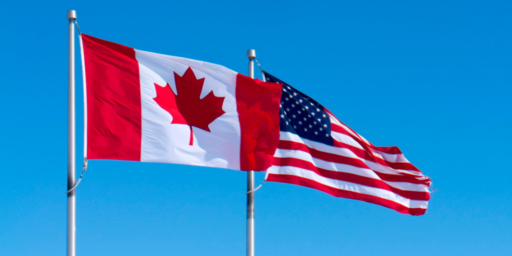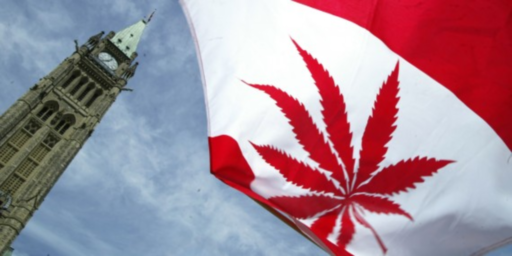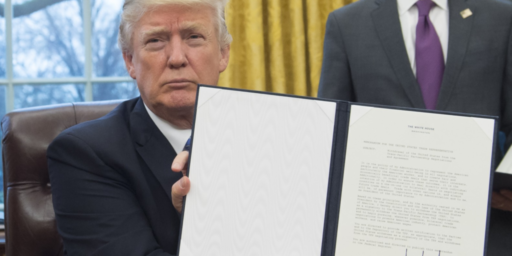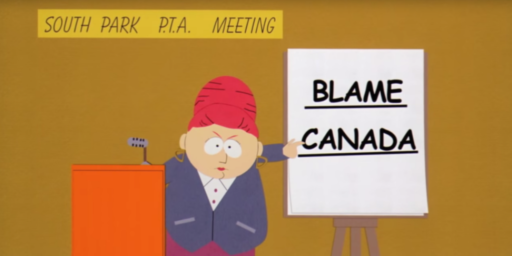Will Wilkinson – Canadian
 Will Wilkinson became a Canadian at midnight. Canadian Press’ Bruce Cheadle reports:
Will Wilkinson became a Canadian at midnight. Canadian Press’ Bruce Cheadle reports:
Wilkinson, to use the breezy term used by Citizenship and Immigration Canada, will be “waking up Canadian” on Friday morning as new and controversial changes to the Citizenship Act become law.
“It’s a strange thing to all-of-a-sudden one day gain a citizenship to a new country,” the 36-year-old journalist from Iowa said Thursday as he rode the train to Ottawa. “It’s exciting to me. I like the idea of just having a bigger community.”
Wilkinson is gaining citizenship by virtue of his Saskatchewan-born father, who moved to the United States in the 1960s and became an American, losing his Canadian passport in the process. When Bill C-37, an amendment to the Citizenship Act, takes the full force of law Friday, the elder Wilkinson will join thousands of so-called “lost Canadians” who automatically have their citizenship restored.
[…]
A new two-generation rule – which ends the line of citizenship for children born outside Canada to Canadian parents who were also born abroad – was inserted as a sort of quid pro quo in Bill C-37. But critics say that while correctly fixing administrative problems that disenfranchised an untold number of Canadians in the past, the government has elected to “fundamentally change” Canadian citizenship law and disenfranchise an untold number of Canadians of the future.
[…]
Rudyard Griffiths, founder of the Dominion Institute, describes a “growing diaspora of disengaged citizens who live permanently abroad, who aren’t assuming any of the responsibilities and obligations, but enjoy almost all of its rights and privileges.”
Apparently, the rule change was set in motion after some Lebanese-Canadians were given asylum in 2006.
While it may seem odd at first blush that an American-born child of a naturalized American citizen could have dual citizenship in Canada, the United States allows dual citizenship, too. Plenty of Americans move abroad and take citizenship in other countries without losing their American citizenship for themselves or their children.
Of course, the real question is why the United States and Canada still pretend to be separate countries. We speak the same language (minus, officially, Quebec), are each other’s largest trading partners, members of NATO, and travel more-or-less freely across the largest international border in the world.






The odd thing in the circumstance described in the excerpt is that Will’s father was no longer a Canadian citizen when Will was born.
It would make sense if Will’s father was still a citizen at the time, but this way? I suppose it makes Canadian sense.
Ah: But Will’s father’s citizenship has been retroactively restored! So, naturally, his citizenship would have passed to Will.
Now, apparently, unless Will moves to Canada, his own children won’t become Canadians.
There are some subtle and substantive differences. There are considerable Canadian sensibilities about us regarding our size and disproportinate influence on Canadian culture that won’t go away anytime soon. There is also the matter of the Queen (of England) as the sovereign of Canada. French is not the official language in only Quebec, but the entire country. And there are those differences which are wedge issues on both sides of the border such as universal health care and gun control. I don’t see Canadians willing to give up their health care and adopt a US model anytime soon.
That’s the part that doesn’t make sense to me. I suppose I’m too used to the US bureaucracy which would at least require an application for this.
Oh, and a fee.
“Of course, the real question is why the United States and Canada still pretend to be separate countries.”
As an outside observer (British) who has fairly extensive dealing with both Americans and Canadians (and who likes both), I find this is a slightly odd and weirdly ahistorical assumption that seems very common in the US (on the other side of the political spectrum, Yglesias seems to spend a lot of time blithely babbling on about the supposed inevitability of Canada joining the Union) and extremely uncommon amongst Canadians (absent some Albertans who find Canadian politics too left wing). The odd thing is that there are a fair number of similar countries out there that are not rushing to merge and this is generally not seen to be peculiar, but apparently the fact that Canada isn’t gleefully lining up to be subsumed within the USA (which, let’s face it, is really what we’re talking about here) is boundlessly puzzling.
Now, if only we could get the British to do something like this, then I think I would automatically get British citizenship. Incidently, I would have had Canadian citizenship under this rule, if my dad had bothered to get Canadian citizenship while he lived there (he was born in Great Britain, but spent most of his childhood and the first ten years of his adult life in Canada).
Wow, I didn’t see the Annex Canada Now argument coming at all! Almost spilled my coffee.
What, you one of them wacko North American Union types? Next you’ll be advocating for round bacon.
The horror.
Of course I could be tempted to support the union of unequals by the increased availability of poutine and cheap Canadian beer.
My ex-wives have forced me to continue to support the union of unequals, even after said unions were severed. Granted, no poutine or cheap Canadian beer was involved.
“U.S. law does not mention dual nationality or require a person to choose one citizenship or another.”
Well, sort of. True, the last time I had actual knowledge was in the late 1960’s; at that time a US citizen could become a dual-citizenship holder as long as the other country allowed dual citizenship. BUT an applicant for US citizenship had to give up any other citizenship. That is, A US citizen could accept UK citizenship without losing US citizenship, but a UK citizen could not become a US citizen without giving up UK citizenship.
And on the 2 generation cut-off of Canadian citizenship, be ready to see a very significant challenge to its applicability on Charter grounds in that it creates a secondary and inferior class of citizenship… or at least that is what a good friend of mine who is a Canadian immigration lawyer was telling me two weeks ago. People are waiting for a very attractive test case to come forward….
While the Oath for U.S. citizenship does state that a newly naturalizing citizen renounces all previous citizenships, the courts have held that no one is really required to give up their prior citizenship. The statutory language of the Oath hasn’t kept up with the Bench.
-Bill from U.S. Citizenship and Immigration Services, speaking on his own behalf and not for the government generally, the Dept of Homeland Security, or U.S. Citizenship and Immigration Services (/legal disclaimer)